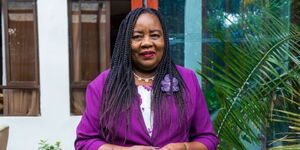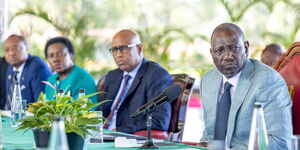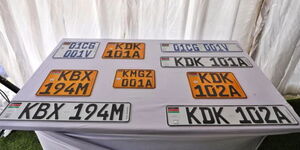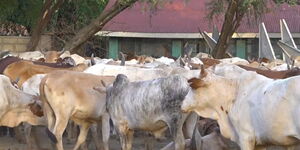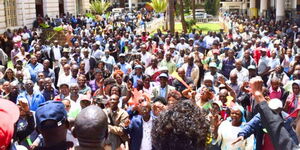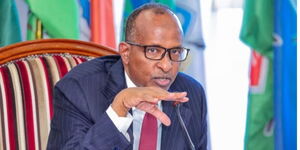Chief Justice David Maraga left an indelible mark in the country’s history when he left office in January 2021.
For many Kenyans, the defiant-style leadership that mostly had him at loggerheads with the executive arm of government would be a huge welcome this year. A year that has seen the Judiciary become the only fighting chance for Kenyans seeking to stop new levies and policies they believe are meant to make life even more expensive.
From writing a letter advising President Uhuru Kenyatta to dissolve Parliament to expressing strong criticism regarding the slashed budget of the President’s office, Maraga has proven to be a significant force in leadership.
What many are unaware of is the Chief Justice's initial display of bold leadership, where he chose not to reside in a Ksh310 million mansion, which is typically expected for occupants of the office.
1. The Mansion
From photos seen by Kenyans.co.ke, the mansion, located in Runda, spots a special driveway and has a seemingly unkempt swimming pool on its compound.
The house remains occupied only by a farm-hand and a number of police officers who keep guard of the premises.
It was reportedly purchased from Machakos Senator Johnstone Muthama in a transaction that raised a lot of eyebrows and attracted the attention of the Ethics and Anti-Corruption Commission (EACC) in 2013.
In January 2020, Judiciary Chief Registrar Anne Amadi confirmed that the house had stayed vacant because it was in an inhabitable position due to budget cuts.
Throughout his four-year reign, Maraga lived in his private home in Karen.
2. Ruling to overturn 2017 presidential results
The marking point in the career of the CJ was, however, marked in 2017 when his bench cancelled the presidential elections that President Uhuru Kenyatta had been announced the winner. It was the first time that a court had made such a momentous decision in Africa.
Maraga's team annulled the elections due to what it termed as irregularities ordering another within 60 days. In the repeat elections, former Prime Minister Raila Odinga refused to participate claiming that opponents were preparing to rig.
The decision stirred a political storm at the time with Uhuru vowing to respect its decision but branding the judges as crooks.
The outgoing CJ had noted that the Independent Electoral and Boundaries Commission (IEBC) had failed "to conduct the presidential election in a manner consistent with the dictates of the constitution."
Raila would later attempt to swear himself in as the people's president in 2018 before later calling a truce with Uhuru in a special handshake that has stayed to this day.
3. Complaint to Uhuru over budget cuts
The outgoing CJ's differences with the President would in November 2019 manifest again after the latter called for a press complain to lament of extreme budgetary complaints.
In his complaint, Maraga claimed that he was struggling with footing various bills including that of wifi.
Maraga disclosed that the budget cuts imposed on the Judiciary were hurting service delivery countrywide.
"Here is where a CJ calls Treasury and no one is picking my calls. What else am I expected to do?"
“Unless the budget cuts are reversed, we do not have money for fuel, we will not have mobile courts, we will not have the court of appeal circuits, we will not be able to pay for wi-fi for the e-filing and e-payments and plans to automate courts will halt," he stated.
Maraga argued that the Judiciary did not demand a lot of money from the state explaining that they would comfortably survive on a budget ranging between Ksh5 billion and Ksh6 billion every year.
4. Letter to dissolve Parliament
In September 2020, the CJ always made headlines after he penned a letter to Uhuru asking him to dissolve the current Parliament.
He argued that the legislature had contravened the Constitution by failing to enforce the two-thirds gender rule.
"The petitions are based on the ground that, despite four Court orders compelling Parliament to enact the legislation required to implement the two-thirds gender rule in accordance with Article 27(3) read together with Articles 81(b) and 100 of the constitution, Parliament has blatantly failed, refused and/or neglected to do so.
"Your Excellency, "the two-thirds gender rule" is an acronym for the constitutional imperative which prohibits any form of discrimination in the appointive and elective positions in our country on the basis of one's gender," read Maraga's letter in part.
Uhuru is, however, yet to act on the letter.
5. Baby mama drama
In Mid-2020, a woman identified as Mary Kwamboka Onyancha, went to the entrance of the Supreme Court gate in Nairobi and wailed claiming that she was singlehandedly raising a child she allegedly sired with the outgoing CJ.
The issue made headlines in June 2020 although it was later thrown out of court after Kwamboka failed to file the case properly.
The court found that the complainant who was suing the CJ for child support had not properly filed the case as she had failed to pay the requisite fee of Ksh655.
Lawyer Danstan Omari who was representing the CJ sought the case to be dismissed after the accuser failed to show up in court.
Among the errors Omari noted in the case included, was a fictitious registrar of births by the name F.O Shamwata in the country.






